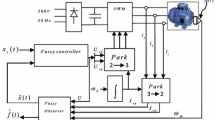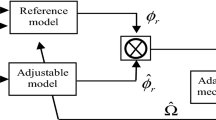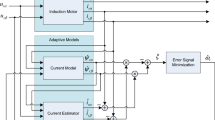Abstract
In this paper, a new fault-tolerant control strategy is suggested to control the induction motors (IMs). The mathematical model of IMs is supposed to be unknown and also the main disturbances such as perturbation in the rotor resistance, and suddenly changes in the load torque are considered. A general type-2 fuzzy system using a new non-singleton fuzzification is proposed to cope with the uncertainties. The robustness and the stability of the proposed control scheme is studied on basis of the Lyapunov theorem. The simulation results show that the suggested control method has good performance in the versus of unknown dynamics of IM, time-varying disturbances, abrupt faults and measurement errors. The proposed scheme is compared with other popular control systems and other kind of fuzzy systems and singleton fizzification.




















Similar content being viewed by others
Availability of data and material
There is no data and material.
References
Ali ES (2015) Speed control of induction motor supplied by wind turbine via imperialist competitive algorithm. Energy 89:593–600
Ammar A, Talbi B, Ameid T, Azzoug Y, Kerrache A (2019) Predictive direct torque control with reduced ripples for induction motor drive based on t–s fuzzy speed controller. Asian J Control. https://doi.org/10.1002/asjc.2148
Boumella N, Djouani K, Boulemden M (2012) A robust interval type-2 TSK fuzzy logic system design based on chebyshev fitting. Int J Control Autom Syst 10(4):727–736
Chang W-J, Lin Y-H, Du J, Chang C-M (2019) Fuzzy control with pole assignment and variance constraints for continuous-time perturbed Takagi–Sugeno fuzzy models: application to ship steering systems. Int J Control Autom Syst 17(10):2677–2692
Castillo O, Atanassov K (2019) Comments on fuzzy sets, interval type-2 fuzzy sets, general type-2 fuzzy sets and intuitionistic fuzzy sets. In: Recent advances in intuitionistic fuzzy logic systems. Springer, Berlin, pp 35–43
Castillo O, Melin P, Valdez F, Soria J, Ontiveros-Robles E, Peraza C, Ochoa P (2019) Shadowed type-2 fuzzy systems for dynamic parameter adaptation in harmony search and differential evolution algorithms. Algorithms 12(1):17
Das A, Bera UK, Maiti M (2018) Defuzzification and application of trapezoidal type-2 fuzzy variables to green solid transportation problem. Soft Comput 22(7):2275–2297
Deng W, Yao R, Zhao H, Yang X, Li G (2019) A novel intelligent diagnosis method using optimal LS-SVM with improved PSO algorithm. Soft Comput 23(7):2445–2462
Dong C, Brandstetter P, Vo HH, Tran TC, Vo DH (2016) Adaptive sliding mode controller for induction motor. In: International conference on advanced engineering theory and applications. Springer, Berlin, pp 543–553
Farah N, Talib MHN, Shah NSM, Abdullah Q, Ibrahim Z, Lazi JBM, Jidin A (2019) A novel self-tuning fuzzy logic controller based induction motor drive system: an experimental approach. IEEE Access 7:68172–68184
Fekih A (2008) Effective fault tolerant control design for nonlinear systems: application to a class of motor control system. IET Control Theory Appl 2(9):762–772
Gopal BV, Shivakumar E (2019) Design and simulation of neuro-fuzzy controller for indirect vector-controlled induction motor drive. In: Nagabhushan P, Guru D, Shekar B, Kumar Y (eds) Data analytics and learning. Springer, Berlin, pp 155–167
Guazzelli PRU, de Andrade Pereira WC, de Oliveira CMR, de Castro AG, de Aguiar ML (2018) Weighting factors optimization of predictive torque control of induction motor by multiobjective genetic algorithm. IEEE Trans Power Electron 34(7):6628–6638
Guedes JJ, Castoldi MF, Goedtel A, Agulhari CM, Sanches DS (2019) Differential evolution applied to line-connected induction motors stator fault identification. Soft Comput 23(21):11217–11226
Jana DK, Pramanik S, Sahoo P, Mukherjee A (2019) Interval type-2 fuzzy logic and its application to occupational safety risk performance in industries. Soft Comput 23(2):557–567
Jhang J-Y, Lin C-J, Lin C-T, Young K-Y (2018) Navigation control of mobile robots using an interval type-2 fuzzy controller based on dynamic-group particle swarm optimization. Int J Control Autom Syst 16(5):2446–2457
Kalat AA (2019) A robust direct adaptive fuzzy control for a class of uncertain nonlinear mimo systems. Soft Comput 23(19):9747–9759
Kali Y, Rodas J, Saad M, Gregor R, Benjielloun K, Doval-Gandoy J, Goodwin G (2018) Speed control of a five-phase induction motor drive using modified super-twisting algorithm. In: International symposium on power electronics, electrical drives, automation and motion (SPEEDAM). IEEE, pp 938–943
Kubota H, Matsuse K (1994) Speed sensorless field-oriented control of induction motor with rotor resistance adaptation. IEEE Trans Ind Appl 30(5):1219–1224
Lascu C, Jafarzadeh S, Fadali MS, Blaabjerg F (2016) Direct torque control with feedback linearization for induction motor drives. IEEE Trans Power Electron 32(3):2072–2080
Lim CS, Levi E, Jones M, Rahim NA, Hew WP (2013) FCS-MPC-based current control of a five-phase induction motor and its comparison with PI-PWM control. IEEE Trans Ind Electron 61(1):149–163
Lopes TD, Goedtel A, Palácios RHC, Godoy WF, de Souza RM (2017) Bearing fault identification of three-phase induction motors bases on two current sensor strategy. Soft Comput 21(22):6673–6685
Masumpoor S, Khanesar MA et al (2015) Adaptive sliding-mode type-2 neuro-fuzzy control of an induction motor. Expert Syst Appl 42(19):6635–6647
Melin P, Ontiveros-Robles E, Gonzalez CI, Castro JR, Castillo O (2019) An approach for parameterized shadowed type-2 fuzzy membership functions applied in control applications. Soft Comput 23(11):3887–3901
Mohammadzadeh A, Kaynak O (2019) A novel general type-2 fuzzy controller for fractional-order multi-agent systems under unknown time-varying topology. J Frankl Inst 356(10):5151–5171
Mohammadzadeh A, Zhang W (2019) Dynamic programming strategy based on a type-2 fuzzy wavelet neural network. Nonlinear Dyn 95(2):1661–1672
Mohammadzadeh A, Ghaemi S, Kaynak O et al (2019a) Robust predictive synchronization of uncertain fractional-order time-delayed chaotic systems. Soft Comput 23(16):6883–6898
Mohammadzadeh A, Sabzalian MH, Zhang W (2019b) An interval type-3 fuzzy system and a new online fractional-order learning algorithm: theory and practice. IEEE Trans Fuzzy Syst 28:1940–1950
Ontiveros-Robles E, Melin P (2020) Toward a development of general type-2 fuzzy classifiers applied in diagnosis problems through embedded type-1 fuzzy classifiers. Soft Comput 24(1):83–99
Ponce P, Ponce H, Molina A (2018) Doubly fed induction generator (DFIG) wind turbine controlled by artificial organic networks. Soft Comput 22(9):2867–2879
Regaya CB, Farhani F, Zaafouri A, Chaari A (2018) A novel adaptive control method for induction motor based on backstepping approach using dSpace DS 1104 control board. Mech Syst Signal Process 100:466–481
Sabzalian MH, Mohammadzadeh A, Lin S, Zhang W (2019a) Robust fuzzy control for fractional-order systems with estimated fraction-order. Nonlinear Dyn 98(3):2375–2385
Sabzalian MH, Mohammadzadeh A, Lin S, Zhang W (2019b) New approach to control the induction motors based on immersion and invariance technique. IET Control Theory Appl 13:1466–1472
Shabanian M, Montazeri M (2011) A neuro-fuzzy online fault detection and diagnosis algorithm for nonlinear and dynamic systems. Int J Control Autom Syst 9(4):665
Thangaraj R, Chelliah TR, Pant M, Abraham A, Grosan C (2011) Optimal gain tuning of pi speed controller in induction motor drives using particle swarm optimization. Log J IGPL 19(2):343–356
Uddin MN, Radwan TS, Rahman MA (2002) Performances of fuzzy-logic-based indirect vector control for induction motor drive. IEEE Trans Ind Appl 38(5):1219–1225
Ustun SV, Demirtas M (2008) Optimal tuning of pi coefficients by using fuzzy-genetic for v/f controlled induction motor. Expert Syst Appl 34(4):2714–2720
Xu D, Song X, Jiang B, Yang W, Yan W (2019) Data-driven sliding mode control for mimo systems and its application on linear induction motors. Int J Control Autom Syst 17(7):1717–1725
Xu D, Huang J, Su X, Shi P (2019) Adaptive command-filtered fuzzy backstepping control for linear induction motor with unknown end effect. Inf Sci 477:118–131
Yu X, Dunnigan MW, Williams BW (2001) Comparative study of sliding mode speed and position control of a vector-controlled induction machine. Trans Inst Measur Control 23(2):83–101
Zarandi MF, Soltanzadeh S, Mohammadi A, Castillo O (2019) Designing a general type-2 fuzzy expert system for diagnosis of depression. Appl Soft Comput 80:329–341
Zina HB, Allouche M, Souissi M, Chaabane M, Chrifi-Alaoui L, Bouattour M (2018) A Takagi–Sugeno fuzzy control of induction motor drive: experimental results. Int J Autom Control 12(1):44–61
Zhang Y, Yang H (2015) Two-vector-based model predictive torque control without weighting factors for induction motor drives. IEEE Trans Power Electron 31(2):1381–1390
Zhang Y, Yang H, Xia B (2016) Model-predictive control of induction motor drives: torque control versus flux control. IEEE Trans Ind Appl 52(5):4050–4060
Zhao Z, Yu J, Zhao L, Yu H, Lin C (2018) Adaptive fuzzy control for induction motors stochastic nonlinear systems with input saturation based on command filtering. Inf Sci 463:186–195
Zhang Z, Wang T, Chen Y, Lan J (2019) Design of type-2 fuzzy logic systems based on improved ant colony optimization. Int J Control Autom Syst 17(2):536–544
Zhao T, Li P, Cao J (2019) Self-organising interval type-2 fuzzy neural network with asymmetric membership functions and its application. Soft Comput 23(16):7215–7228
Funding
There is no funding source for this paper.
Author information
Authors and Affiliations
Contributions
Akram Sedaghati contributed to Writing—original draft; formal analysis, and Naser Pariz, Mehdi Siahi and Roohollah Barzamini contributed to formal analysis, writing—review and investigation.
Corresponding author
Ethics declarations
Conflict of interest
The authors declare that they have no conflict of interest.
Code availability
There is no code.
Additional information
Publisher's Note
Springer Nature remains neutral with regard to jurisdictional claims in published maps and institutional affiliations.
Rights and permissions
About this article
Cite this article
Sedaghati, A., Pariz, N., Siahi, M. et al. A new adaptive non-singleton general type-2 fuzzy control of induction motors subject to unknown time-varying dynamics and unknown load torque. Soft Comput 25, 5895–5907 (2021). https://doi.org/10.1007/s00500-021-05582-y
Published:
Issue Date:
DOI: https://doi.org/10.1007/s00500-021-05582-y




